Pakistan: what's behind the deepening political crisis?
Protesters clash with police and attempt to storm PM's house as 'all hell breaks loose' in Islamabad
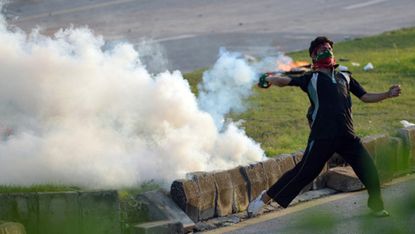
After weeks of protests in the Pakistani capital of Islamabad, tensions in Parliament Square reached a "predictable escalation" over the weekend, according to Al Jazeera.
Three people were killed and hundreds injured after the police cracked down on protesters who were attempting to march on the official residence of Prime Minister Nawaz Sharif. According to Pakistan's police chief, protesters were armed with "axes and hammers" and tore down the outer wall of parliament.
Police have been criticised for their disproportionate response after teargas and rubber bullets fired at protesters by 40,000 riot officers. Wajahat Saeed Khan, a Pakistani journalist said "the police are known for their brutality, particularly in the Punjab province".
Subscribe to The Week
Escape your echo chamber. Get the facts behind the news, plus analysis from multiple perspectives.

Sign up for The Week's Free Newsletters
From our morning news briefing to a weekly Good News Newsletter, get the best of The Week delivered directly to your inbox.
From our morning news briefing to a weekly Good News Newsletter, get the best of The Week delivered directly to your inbox.
Who is behind the protests?
The two small opposition groups credited with orchestrating the protests are united in their calls for the resignation of the country's Prime Minister. However, both sides have denied instructing their supporters to use violence or occupy official buildings. "The people who came out to protest were looking for a better country," said Mosharraf Zaidi the former Pakistani foreign affairs adviser, but when they clashed with police, "all hell broke loose".
Pakistan Tehreek-e-Insaf (Pakistan Justice Movement)
Led by the famous cricketer-turned-politician Imran Khan, the party accuses Sharif of rigging last year's historic election, in what was the first democratic transition of power in the country's history.
Pakistan Awami Tehreek (PAT)
Tahir ul-Qadri is the influential Canadian-Pakistani cleric and head of the party calling for a "revolution" and demanding the complete overhaul of the country's political and economic system. He is demanding the dissolution of Pakistan's government and calling for the establishment of an interim unity government.
The role of the military
Rumours of military involvement have been widely circulated in Pakistan with some calling it a 'soft coup'. Many Pakistani's believe that Sharif has angered military by "seeking closer relations with India," which would could lead to a decrease in military funding, writes Channel 4's John Sparks. The army has denied the allegations and says it is serving as a mediator between the protesters and government.
What next?
Sharif has held high-level crisis talks with the army chief General Raheel Sharif today, according to the BBC, but both parties have yet to issue a statement. "Pakistan's parliamentary democracy is at stake. A decision has to be made fast," warned Zaidi.
The government has said it willing to conduct an investigation into the allegations of vote-rigging but ruling party members say the Prime Minister will not step down. All elected parties have pledged their support to Sharif, writes Raza Rumi for Al Jazeera. One minister told the Express Tribune:"we might have to give big sacrifices".
Sharif has been "considerably weakened" and "even if he survives the crisis, it may not be the end of the story. If the PM is forced to resign it sets a wrong and dangerous precedent," writes Rumi.
Create an account with the same email registered to your subscription to unlock access.
Sign up for Today's Best Articles in your inbox
A free daily email with the biggest news stories of the day – and the best features from TheWeek.com
-
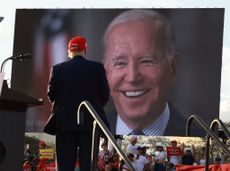 'Voters know Biden and Trump all too well'
'Voters know Biden and Trump all too well'Instant Opinion Opinion, comment and editorials of the day
By Harold Maass, The Week US Published
-
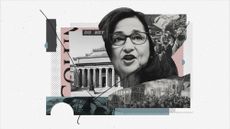 Is the Gaza war tearing US university campuses apart?
Is the Gaza war tearing US university campuses apart?Today's Big Question Protests at Columbia University, other institutions, pit free speech against student safety
By Joel Mathis, The Week US Published
-
 DOJ settles with Nassar victims for $138M
DOJ settles with Nassar victims for $138MSpeed Read The settlement includes 139 sexual abuse victims of the former USA Gymnastics doctor
By Justin Klawans, The Week US Published
-
 Will Aukus pact survive a second Trump presidency?
Will Aukus pact survive a second Trump presidency?Today's Big Question US, UK and Australia seek to expand 'game-changer' defence partnership ahead of Republican's possible return to White House
By Sorcha Bradley, The Week UK Published
-
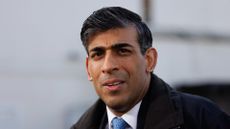 It's the economy, Sunak: has 'Rishession' halted Tory fightback?
It's the economy, Sunak: has 'Rishession' halted Tory fightback?Today's Big Question PM's pledge to deliver economic growth is 'in tatters' as stagnation and falling living standards threaten Tory election wipeout
By Harriet Marsden, The Week UK Published
-
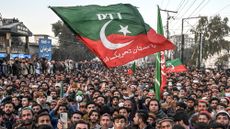 Is Pakistan on the cusp of a revolution?
Is Pakistan on the cusp of a revolution?Today's Big Question Country's largest party shut out of power after 'mandate thieves' agree new coalition favoured by military
By Elliott Goat, The Week UK Published
-
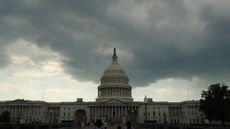 'Neither major party offers a vision I can relate to'
'Neither major party offers a vision I can relate to'Instant Opinion Opinion, comment and editorials of the day
By Harold Maass, The Week US Published
-
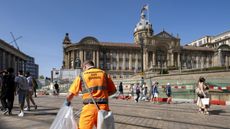 Why your local council may be going bust
Why your local council may be going bustThe Explainer Across England, local councils are suffering from grave financial problems
By The Week UK Published
-
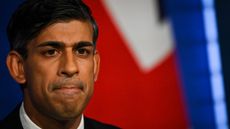 Rishi Sunak and the right-wing press: heading for divorce?
Rishi Sunak and the right-wing press: heading for divorce?Talking Point The Telegraph launches 'assault' on PM just as many Tory MPs are contemplating losing their seats
By Keumars Afifi-Sabet, The Week UK Published
-
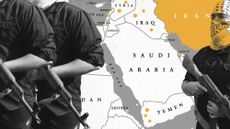 What do Iran and its proxies want from Middle East escalation?
What do Iran and its proxies want from Middle East escalation?Today's Big Question Tehran launched attacks on Iraq, Pakistan and Syria this week, heightening tensions in the region
By Richard Windsor, The Week UK Published
-
 How would a second Trump presidency affect Britain?
How would a second Trump presidency affect Britain?Today's Big Question Re-election of Republican frontrunner could threaten UK security, warns former head of secret service
By Harriet Marsden, The Week UK Published